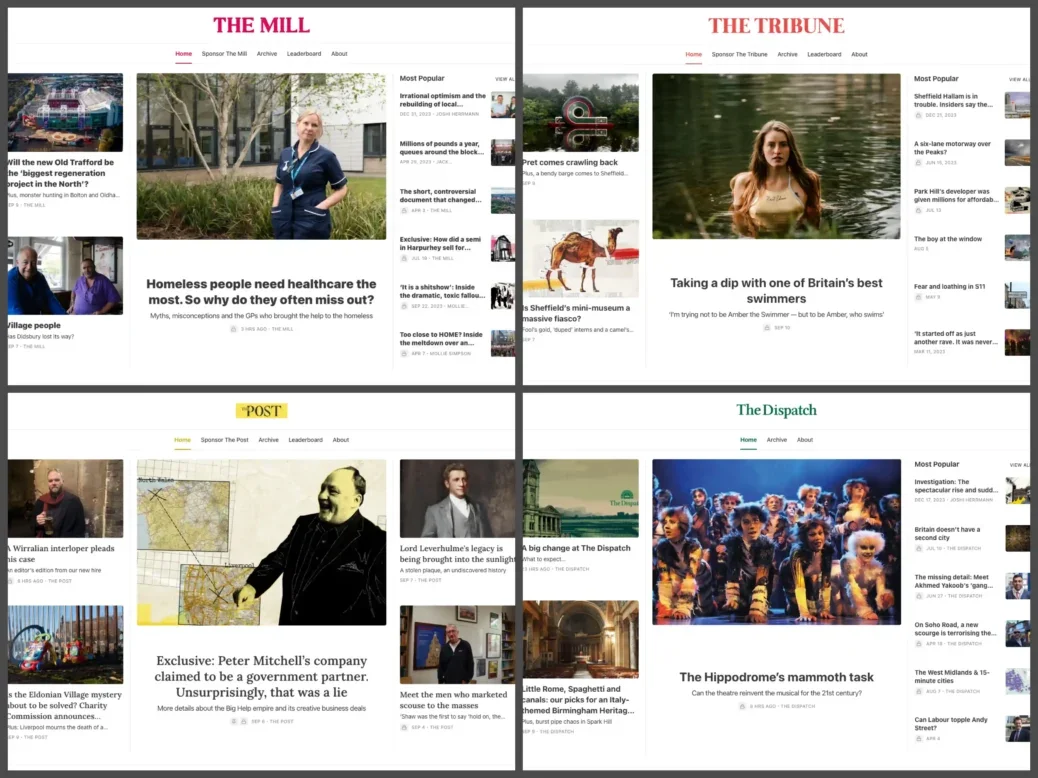
Manchester Mill and its sister titles are moving off newsletter platform Substack for the first time and onto websites hosted by competitor Ghost.
The Manchester Mill launched on Substack in 2020 and the Birmingham Dispatch, Sheffield Tribune and Liverpool Post followed suit.
Mill Media founder Joshi Herrmann told Press Gazette that its forthcoming publications covering Glasgow and London will launch on dedicated websites built through Ghost, and that the other four will ultimately shift to go the same way.
Herrmann stressed to Press Gazette that the departure was not acrimonious, saying “it’s been a difficult decision”.
“Substack have been a really good partner for us,” he said on Wednesday. “They’ve been a big part of our growth… We’re really grateful for the support we got from them during the Substack local initiative. I don’t want to make it sound like there’s some big issue with Substack, because there isn’t.”
Instead, he said, the move was prompted by cost considerations, the relationship Mill Media wanted with its audience and its desire for greater customisation as it matures.
Mill Media says it is approaching £1m annual revenue
Substack takes 10% of the subscription revenue earned by newsletters on the platform, and Herrmann said “that would represent more than £100,000 pounds for us next year”, suggesting the company anticipates annual turnover of £1m in 2025.
The company had told Press Gazette it was on course to book £400,000 in annual revenue in August last year. In November 2022, when it first hit profitability, it appeared to be making £264,000.
Ghost does not take a revenue share but charges a flat fee for usage based on audience size: a team with five staff users and up to 1,000 audience members pays $50 per year while a company that wants to reach 10,000 members with an unlimited number of employees pays $199 and prices continue upwards from there.
John O’Nolan, the chief executive of of Ghost, said: “Mill Media has proven that local news can be independent, high quality, and crucially sustainable. We’re thrilled they’re moving to Ghost, and we look forward to working with them as they continue building their business and inspiring others to follow in their footsteps.”
“I want to spend as much of our money as possible on journalists,” Herrmann said. “We are going to save a lot of money by publishing on Ghost and using custom websites rather than Substack, and that’s important for us because we’re not a media giant, we need to spend our income carefully.”
Herrmann said that the 10% cut taken by Substack “makes sense for a lot of people… if you derive most of your growth from Substack it makes sense”.
A newsletter about national politics or technology, he said, stood to benefit from Substack’s large user base.
“The difference for us, and for other local publishers, is we’re only looking for growth in one particular place, and so the value of Substack’s… network effects are reduced.”
Herrmann said the Mill also wanted “to have a direct relationship with our users rather than being mediated by a platform”, particularly because Substack is currently promoting its app and introducing features more commonly associated with social media, for example followers.
“People who are followers… they’re not people who we can take with us when we leave,” he said.
He said “I 100% understand” why Substack wants its users to embrace the app, “but it doesn’t align with our ambition to be an independent media company where we have a direct relationship with our users”.
The last reason for the departure, Herrmann said, was that “we increasingly want to plug in more custom tools”, for example to allow the company to A/B test its landing pages and welcome emails. “That will all be easier when we have a more custom stack [of publisher technologies].”
He added it would “allow us to make our sites look more distinctive and more professional”.
Substack co-founder Hamish McKenzie said: “We’ve always been optimistic about the potential of the Substack model for local news. The success of Joshi and his team at Mill Media have demonstrated the model’s viability.
“We’re incredibly proud of what they’ve achieved on Substack, and we’ll root for them as they take this next step.”
In 2021 the Mill Media titles won funding of up to $100,000 from Substack as part of a scheme to support local journalism on the platform.
The company has hired Novara Media’s Moya Lothian-McLean and freelance Robbie Armstrong to launch its as-yet unnamed Glasgow title this autumn.
Herrmann said this week they are close to finishing hiring for the also-unnamed London title, with 12 long reads already commissioned and six of them filed. Some 270 people applied for a staff writer role with the new publication, he added.
The two new titles are being launched as part of an expansion slated to double Mill Media’s total headcount from 11 to 22 over six months. The growth is being funded using £350,000 raised last year from investors including CNN chief executive Mark Thompson and Axios publisher Nicholas Johnston.
Email pged@pressgazette.co.uk to point out mistakes, provide story tips or send in a letter for publication on our "Letters Page" blog
